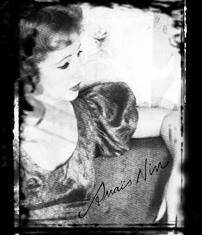




diaries
selections from "henry and june, from a journal of love"
"For you and for me the highest moment, the keenest joy, is not when our minds dominate but when we lose our minds..." Feb. 1932 from Henry and June
"But," I said, laughing," if I become happy and banal, the art costuming, which owes its existence purely to a sense of inferiority, will be mortally affected." The pathological basis of creation! Well become of the creator if I become normal? Or will I merely gaining strength, so as to live out my instincts more fully? I will probably develop different and more interesting illnesses. Allendy said that what was more important was to become equal to life." June 1932 from Henry and June
"Women always think that when they have my shoes, my dress, my hairdresser, my makeup, it will all work the same way. They do not conceive of the witchcraft that is needed. They do not know that I am not beautiful but that I only appear to be at certain moments." June 1932 from Henry and June
"There will never be darkness because in both of us there's always movement, renewal, surprises. I have never known stagnation. Not even introspection has been a still experience..." August 1932 from Henry and June
"You are so terribly nimble, so clever. I distrust your cleverness. You make a wonderful pattern, everything is in its place, it looks convincingly clear, too clear. And meanwhile, where are you? Not on the clear surface of your ideas, but you have already sunk deeper, into darker regions, so that one only thinks one has been given all your thoughts, one only imagines you have emptied yourself in that clarity. But there are layers and layers -- you're bottomless, unfathomable. Your clearness is deceptive. You are the thinker who arouses most confusion in me, most doubt, most disturbance." August 1932 from Henry and June
"I see myself wrapped in lies, which do not seem to penetrate my soul, as if they are not really a part of me. They are like costumes." August 1932 from Henry and June
"To lie, of course, is to engender insanity." August 1932 from Henry and June
selections from "incest, from a journal of love"
"This abdiction of life demanded of the artist is to be achieved only relatively. Most artists have retired too absolutely; they grow rusty, inflexible to the flow of currents." November 26, 1932 from Incest
"I disregard the proportions, the measures, the tempo of the ordinary world. I refuse to live in the ordinary world as ordinary women. To enter ordinary relationships. I want ecstasy. I am a neurotic -- in the sense that I live in my world. I will not adjust myself to the world. I am adjusted to myself." March 25, 1933 from Incest
"We came to the question of lies. It seemed to me that I knew
then why June and I lied:
1 -- because, lacking confidence, we
fear what we reveal may but be admirable. Being narcissists, we also hate to
show what we believe to be of failing or a weakness.
2 --
because of the fear of hurting." April 19, 1933 from Incest
(referring to her diary) "But I need a place where I can shout and weep. I have to be a Spanish savage at some time of the day. I record here the hysteria life causes in me. The overflow of an undisciplined extravagance. To hell with taste and art, with all contractions and polishings. Here I shout, I dance, I weep, I gnash my teeth, I go mad -- all by myself, in bad English, in chaos. It will keep me sane for the world and for art." Oct. 27, 1933 from Incest
"For me, the adventures of the mind, each inflection of thought, each movement, nuance, discovery is an immense source of exhilaration." January 20, 1934 from Incest
"I seek the real stuff of life. Profound drama." Feb. 5, 1934 from Incest
"Oh, God, I know no joy as great as a moment of rushing into a new love, no ecstasy like that of a new love. I swim in the sky; I float; my body is full of flowers, flowers with fingers giving me acute, acute caresses, sparks, jewels, quivers of joy, dizziness, such dizziness. Music inside of one, drunkenness. Only closing the eyes and remembering, and the hunger, the hunger for more, more, the great hunger, the voracious hunger, and thirst." May 30, 1934 from Incest
"No one but a woman in love ever sees the maximum of men's greatness." June 18, 1934 from Incest
(Henry, referring to Anais) "With you one goes so far away from reality that it is almost necessary to buy a return ticket. I am afraid never to come back here." June 30, 1934 from Incest
"I am an excitable person who only understands life lyrically, musically, in whom feelings are much stronger as reason. I am so thirsty for the marvelous that only the marvelous has power over me. Anything I can not transform into something marvelous, I let go. Reality doesn't impress me. I only believe in intoxication, in ecstasy, and when ordinary life shackles me, I escape, one way or another. No more walls." July 7, 1934 from Incest
"Love is the axis and breath of my life. The art I produce is a byproduct, an excrescence of love, the song I sing, the joy which must explode, the overabundance -- that is all!" Oct. 21, 1934 from Incest
selections from "fire, from a journal of love"
"In creation alone there is the possibility of perfection." May 11, 1935 from Fire
"How the real marred, destroyed, the most beautiful of all unrealities..." Oct. 28, 1935 from Fire
"Experience teaches acceptance of the imperfect as life." Feb. 15, 1936 from Fire
"Everything but happiness is neurosis." Feb. 15, 1936 from Fire
"No desire of the body, but for what lies in there, what lies in the flesh, the world, the thought, the creation, the illumination." March 2, 1936 from Fire
"...to withhold from living is to die and that the more you give of yourself to life the more life nourishes you." March 6, 1936 from Fire
"I say quotations are literary. They are good only when dealing with ideas, not with experience. Experience should be pure, unique." June 5, 1936 from Fire
"I have an attitude now that is immovable. I shall remain outside of the world, beyond the temporal, beyond all the organizations of the world. I only believe in poetry." August 22, 1936 from Fire
"Ecstasy is the moment of exaltation from wholeness!" September 10, 1936 from Fire
"Creation which cannot express itself becomes madness." October 18, 1936 from Fire
"The organization of the world is a task for realists. The poet and the workman will always be victims of power and interest. The world will ever be run by a mystic idea, because by the time it begins to function it ceases to be mystical. When the Catholic church became done force, and organization, it ceased to be mystic! The realist always conquers the poetic as the human. Interest wins out. The world will always be ruled by soulless people and power." November 25, 1936 from Fire
"The monster I kill every day is the monster of realism. The monster who attacks me every day is destruction. Out of the duel comes the transformation. I turn destruction into creation over and over again." December 21, 1936 from Fire
"When he(Gonzolo) talks about the artist's role in the transformation of the world, I answer with great sweetness and gentleness: "I thought that when I was 16. Afterward, I realized the futility of it and I worked obstinately to build an individually perfect world. This I have done outside, abstracted from reality." January 12, 1937 from Fire
selections from "the diary of ana´s nin, volume one 1931-1934"
"Ordinary life does not interest me. I seek only the high moments. I am in accord with the surrealists, searching for the marvelous." Winter, 1931-1932 from The Diary of Ana´s Nin, Volume One 1931-1934
"You live like this, sheltered, in a delicate world, and you believe you are living. Then you read a book(Lady Chatterley, for instance), or you take a trip, or you talk with Richard, and you discover that you are not living, that you are hibernating. The symptoms of hibernating are easily detectable: first, restlessness. The second symptom(when hibernating becomes dangerous and might degenerate into death): absence of pleasure. That is all. It appears like an innocuous illness. Monotony, boredom, death. Millions live like this(or die like this) without knowing it. They work in offices. They drive a car. They picnic with their families. They raise children. And then some shock treatment takes place, a person, a book, a song, and it awakens them and saves them from death." Winter, 1931-1932 from The Diary of Ana´s Nin, Volume One 1931-1934
"I had always believed in Andre Breton's freedom, to write as one thinks, in the order and disorder in which one feels in thinks, to follow sensations and absurd correlations of events and images, to trust to the new realms they lead one into. "The cult of the marvelous." Also the cult of the unconscious leadership, the cult of mystery, the evasion of false logic. The cult of the unconscious as proclaimed by Rimbaud. It is not madness. It is an effort to transcend the rigidities and the patterns made by the rational mind." Winter, 1931-1932 from The Diary of Ana´s Nin, Volume One 1931-1934
"We have both lost ourselves, but sometimes we reveal the most when we are least like ourselves." January, 1932 from The Diary of Ana´s Nin, Volume One 1931-1934
"I have a mind which is bigger than the rest of me, an inexorable conscience." January, 1932 from The Diary of Ana´s Nin, Volume One 1931-1934
"Passion gives us moments of wholeness." February, 1932 from The Diary of Ana´s Nin, Volume One 1931-1934
"for my life is slowed up by thought and the need to understand what I am living." February, 1932 from The Diary of Ana´s Nin, Volume One 1931-1934
"the truly faithless one is the one who makes love to only a fraction of you. And denies the rest." February, 1932 from The Diary of Ana´s Nin, Volume One 1931-1934
"Man can never know the kind of loneliness a woman knows. Man lies in a woman's womb only to gather strength, he nourishes himself from this fusion, and then he rises and goes into the world, into his work, into battle, into art. He is not lonely. He is busy. The memory of the swim in amniotic fluid gives him energy, completion. The woman may be busy too, but she feels empty. Sensuality for her is not only a wave of pleasure in which he has bathed, and a charge of electric joy at contact with another. When man lies in her womb, she is fulfilled, each act of love is a taking of man within her, and act of birth and rebirth, of child bearing and man bearing. Man lies in her womb and is reborn each time anew with a desire to act, to BE. But for a woman, the climax is not in the birth, but in the moment when man rests inside of her." May 25, 1932 from The Diary of Ana´s Nin, Volume One 1931-1934
"In chaos there is fertility." June, 1932 from The Diary of Ana´s Nin, Volume One 1931-1934
"Real sensuality has no need of stimulants." August, 1933 from The Diary of Ana´s Nin, Volume One 1931-1934
"I had been struck by the analogy between neurosis and romanticism. Romanticism was truly a parallel to neurosis. It demanded of reality an illusory world, love, an absolute which it could never obtain, and thus destroyed itself by the dream." November, 1933 from The Diary of Ana´s Nin, Volume One 1931-1934
"For me, the adventures of the mind, each inflection of thought, each movement, nuance, growth, discovery, is a source of exhilaration." November, 1933 from The Diary of Ana´s Nin, Volume One 1931-1934
"When others asked the truth of me, I was convinced it was not the truth they wanted, but an illusion they could bear to live with." November, 1933 from The Diary of Ana´s Nin, Volume One 1931-1934
diaries novels photos links bookstore bibliography guestbook home
The quotations and photographs contained herein are copyright
of the estate of Ana´s Nin and are used on
this website for the purpose of promoting her journals and her novels.
Site designed and maintained by ilsa.